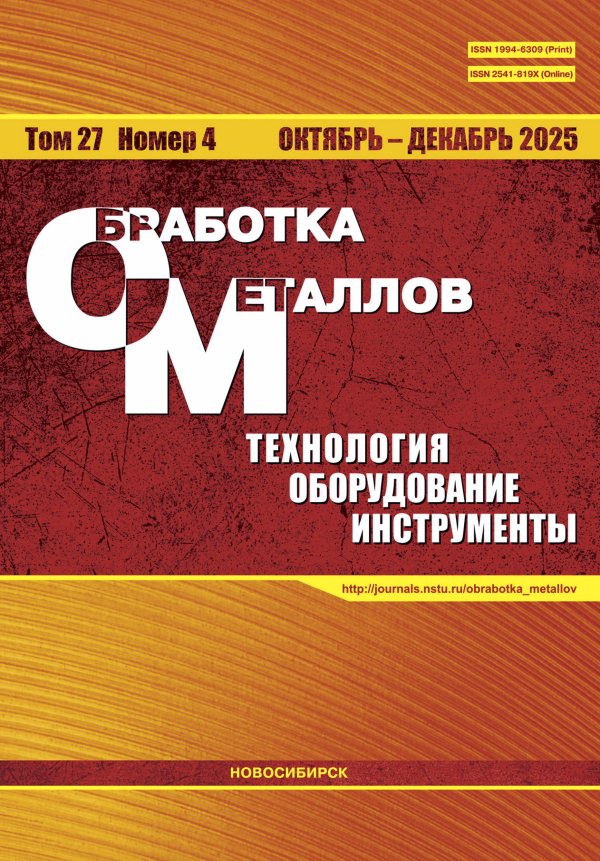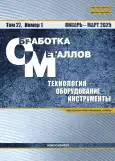Исследование СОЖ с использованием растительного масла, усиленного добавлением наночастиц, при токарной обработке
- Авторы: Маниканта Д.Э.1, Амбхор Н.1, Теллапутта Г.Р.1
-
Учреждения:
- Выпуск: Том 27, № 1 (2025)
- Страницы: 20-33
- Раздел: ТЕХНОЛОГИЯ
- URL: https://journal-vniispk.ru/1994-6309/article/view/290285
- DOI: https://doi.org/10.17212/1994-6309-2025-27.1-20-33
- ID: 290285
Цитировать
Аннотация
Ключевые слова
Об авторах
Д. Э. Маниканта
Email: manijem66@gmail.com
ORCID iD: 0000-0002-0881-4899
канд. техн. наук, доцент, Женский инженерный колледж Шри Вишну (A), Бхимаварам, Андхра-Прадеш, 534202, Индия, manijem66@gmail.com
Н. Амбхор
Email: nitin.ambhore@viit.ac.in
ORCID iD: 0000-0001-8468-8057
канд. техн. наук, доцент, Технологический институт Вишвакармы, Махараштра, Пуна 411037, Индия, nitin.ambhore@viit.ac.in
Г. Р. Теллапутта
Email: drtgopalarao@gmail.com
ORCID iD: 0000-0001-5622-4140
доктор техн. наук, профессор, Инженерно-технологический колледж Св. Анны, Чирала, Андхра-Прадеш, 523187, Индия, drtgopalarao@gmail.com
Список литературы
- Ghosh S., Rao P.V. Application of sustainable techniques in metal cutting for enhanced machinability: a review // Journal of Cleaner Production. – 2015. – Vol. 100. – P. 17–34. – doi: 10.1016/j.jclepro.2015.03.039.
- O’;Sullivan D., Cotterell M. Temperature measurement in single point turning // Journal of Materials Processing Technology. – 2001. – Vol. 118 (1–3). – P. 301–308. – doi: 10.1016/S0924-0136(01)00853-6.
- Waydande R.P., Ghatge D.A. Performance evaluation of cutting parameters for surface roughness & power consumption in turning of 904l stainless steel using vegetable oil based cutting fluids // Advanced Manufacturing and Materials Science: Selected Extended Papers of ICAMMS. – Springer, 2018. – P. 317–325. – doi: 10.1007/978-3-319-76276-0_32.
- Evaluation of vegetable based cutting fluids with extreme pressure and cutting parameters in turning of AISI 304L by Taguchi method / M.H. Cetin, B. Ozcelik, E. Kuram, E. Demirbas // Journal of Cleaner Production. – 2011. – Vol. 19. – P. 2049–2056. – doi: 10.1016/j.jclepro.2011.07.013.
- Manikanta J.E., Ambhore N., Nikhare C. Application of sustainable techniques in grinding process for enhanced machinability: a review // Journal of the Brazilian Society of Mechanical Sciences and Engineering. – 2024. – Vol. 46. – doi: 10.1007/s40430-024-04801-5.
- Katna R., Suhaib M., Agrawal N. Nonedible vegetable oil-based cutting fluids for machining processes – a review // Materials and Manufacturing Processes. – 2020. – Vol. 35 (1). – P. 1–32. – doi: 10.1080/10426914.2019.1697446.
- Examining the role of cutting fluids in machining and efforts to address associated environmental/health concerns / D.P. Adler, W.S. Hii, D.J. Michalek, J.W. Sutherland // Machining Science and Technology. – 2006. – Vol. 10 (1). – P. 23–58. – doi: 10.1080/10910340500534282.
- Agrawal S.M., Patil N.G. Experimental study of non edible vegetable oil as a cutting fluid in machining of M2 steel using MQL // Procedia Manufacturing. – 2028. – Vol. 20. – P. 207–212.
- Sankaranarayanan R., Krolczyk G.M. A comprehensive review on research developments of vegetable-oil based cutting fluids for sustainable machining challenges // Journal of Manufacturing Processes. – 2021. – Vol. 67. – P. 286–313. – doi: 10.1016/j.jmapro.2021.05.002.
- Sharif M.N., Pervaiz S., Deiab I. Potential of alternative lubrication strategies for metal cutting processes: a review // The International Journal of Advanced Manufacturing Technology. – 2017. – Vol. 89. – P. 2447–2479. – doi: 10.1007/s00170-016-9298-5.
- Evaluation of crude watermelon oil as lubricant in cylindrical turning of AISI 1525 steel employing Taguchi and grey relational analyses techniques / R.A. Kazeem, D.A. Fadare, I.G. Akande, T.C. Jen, S.A. Akinlabi, E.T. Akinlabi // Heliyon. – 2024. – Vol. 10 (3). – doi: 10.1016/j.heliyon.2024.e25349.
- Machining performance on SS304 using nontoxic, biodegradable vegetable-based cutting fluids / J.E. Manikanta, B.N. Raju, C. Prasad, B.P. Sankar // Chemical Data Collections. – 2022. – Vol. 42. – doi: 10.1016/j.cdc.2022.100961.
- Experimental evaluation of the lubrication properties of the wheel/workpiece interface in minimum quantity lubrication (MQL) grinding using different types of vegetable oils / Y. Wang, C. Li, Y. Zhang, M. Yang, B. Li, D. Jia, Y. Hou, C. Mao // Journal of Cleaner Production. – 2016. – Vol. 127. – P. 487–499. – doi: 10.1016/j.jclepro.2016.03.121.
- Shaikh J.B., Sidhu J.S. Experimental investigation and optimization of process parameters in turning of AISI D2 steel using different lubricant // International Journal of Engineering and Advanced Technology. – 2014. – Vol. 3 (5). – P. 189–197.
- Puttaswamy J.T., Ramachandra J.S. Experimental investigation on the performance of vegetable oil based cutting fluids in drilling AISI 304L using Taguchi technique // Tribology Online. – 2018. – Vol. 13. – P. 60–66. – doi: 10.2474/troll.13.60.
- Grinding temperature and energy ratio coefficient in MQL grinding of high-temperature nickel-base alloy by using different vegetable oils as base oil / B. Li, H. Li, Y. Zhang, Y. Wang, D. Jia, M. Yang // Chinese Journal of Aeronautics. – 2016. – Vol. 29 (4). – P. 1084–1095.
- End milling of AISI 304 steel using minimum quantity lubrication / M.N. Babu, V. Anandan, N. Muthukrishnan, M. Santhanakumar // Measurement. – 2019. – Vol. 138 (2). – P. 681–689. – doi: 10.1016/j.measurement.2019.01.064.
- Radhika A., Rao S., Yogesh K.B. Evaluating machining performance of AISI 1014 steel using gingelly oil as cutting fluid // Australian Journal of Mechanical Engineering. – 2021. – Vol. 19 (4). – P. 445–456. – doi: 10.1080/14484846.2019.1636517.
- Experimental evaluation of the lubrication performance of mixtures of castor oil with other vegetable oils in MQL grinding of nickel-based alloy / S. Guo, C. Li, Y. Zhang, Y. Wang, B. Li, M. Yang, X. Zhang, G. Liu // Journal of Cleaner Production. – 2017. – Vol. 140 (3). – P. 1060–1076.
- Nanofluids application in machining: a comprehensive review / X. Wang, Y. Song, C. Li, Y. Zhang, H.M. Ali, S. Sharma, R. Li, M. Yang, T. Gao, M. Liu, X. Cui // The International Journal of Advanced Manufacturing Technology. – 2023. – Vol. 131 (5). – doi: 10.1007/s00170-022-10767-2.
- Nanoparticle enriched cutting fluids in metal cutting operation: a review / J.E. Manikanta, R.B. Naga, B.S.S. Phanisankar, M. Rajesh, T.K. Kotteda // Recent Advances in Mechanical Engineering. – Springer, 2023. – doi: 10.1007/978-981-19-2188-9_14.
- Nam J.S., Lee P.H., Lee S.W. Experimental characterization of micro-drilling process using nanofluid minimum quantity lubrication // International Journal of Machine Tools and Manufacture. – 2011. – Vol. 51. – P. 649–652.
- Shen B., Shih A., Tung S.C. Application of nanofluids in minimum quantity lubrication grinding // Tribology Transactions. – 2008. – Vol. 51 (6). – P. 730–737.
- Vasu V., Reddy G.P.K. Effect of minimum quantity lubrication with Al2O3 nanoparticles on surface roughness, tool wear and temperature dissipation in machining Inconel 600 alloy // Journal of Nanoengineering and Nanosystems. – 2011. – Vol. 225 (1). – P. 3–16.
- Reinforced lubrication of vegetable oils with graphene additive in tapping ADC12 aluminum alloy / J. Ni, G. Feng, Z. Meng, T. Hong, Y. Chen, X. Zheng // The International Journal of Advanced Manufacturing Technology. – 2018. – Vol. 94. – P. 1031–1040.
- Experimental assessment of an environmentally friendly grinding process using nanofluid minimum quantity lubrication with cryogenic air / J. Zhang, C. Li, Y. Zhang, M. Yang // Journal of Cleaner Production. – 2018. – Vol. 193. – P. 236–248.
- Manojkumar K., Ghosh A. Assessment of cooling-lubrication and wettability characteristics of nano-engineered sunflower oil as cutting fluid and its impact on SQCL grinding performance // Journal of Materials Processing Technology. – 2016. – Vol. 237. – P. 55–64.
- Manikanta J.E., Ambhore N. Nikhare C. Application of sustainable techniques in grinding process for enhanced machinability: a review // Journal of the Brazilian Society of Mechanical Sciences and Engineering. – 2024. – Vol. 46. – doi: 10.1007/s40430-024-04801-5.
Дополнительные файлы







